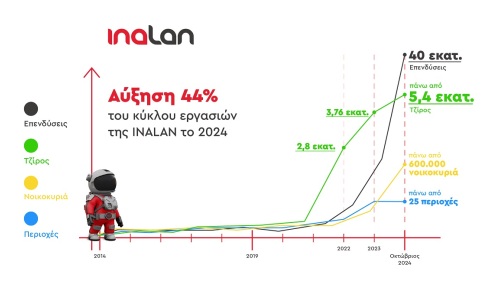
They are hastily putting an end to the party of government guarantees
They are hastily putting an end to the party of government guarantees
After the investigation by the general inspector of Public Administration that confirmed the revelations of Proto Thema, the Finance ministry appears ready to put an end to the factory that had been set up with loans guaranteed by the Greek State....

UPD:
xceeAfter the investigation by the general inspector of Public Administration that confirmed the revelations of Proto Thema, the Finance ministry appears ready to put an end to the factory that had been set up with loans guaranteed by the Greek State.
While 136 of the 138 pages of the bill submitted by midnight yesterday in parliament by the Finance ministry concern the loan of 109 billion euros, the last two pages include a second article, which gives the Finance minister the right to change law no 2322/1995 simply by decree, which describes the conditions and responsibilities for providing a government-backed loan to individuals.
The study indicates that the ministry wants to make significant changes in the 5-6 weeks of the life of this government and parliament that it would not have had the time to enforce if it were promoting a regular bill.
With the conclusion of the general inspector, as Proto Thema published on March 3, the State enters unclear procedures as guarantor for billions in loans.
The "factory" with government guaranteed loans was revealed by Proto Thema since autumn last year. The Greek government pays lavishly for loan forfeitures as a guarantor, without receiving a bill or acting to defend its interests.
Following the complaints from dozens of Chambers in the country, deputy Finance minister Philippos Sachinidis commissioned the general inspector of Public Administration, Leandros Rakintzis, to conduct an independent audit of General Accounting, which he is heading.
While 136 of the 138 pages of the bill submitted by midnight yesterday in parliament by the Finance ministry concern the loan of 109 billion euros, the last two pages include a second article, which gives the Finance minister the right to change law no 2322/1995 simply by decree, which describes the conditions and responsibilities for providing a government-backed loan to individuals.
The study indicates that the ministry wants to make significant changes in the 5-6 weeks of the life of this government and parliament that it would not have had the time to enforce if it were promoting a regular bill.
With the conclusion of the general inspector, as Proto Thema published on March 3, the State enters unclear procedures as guarantor for billions in loans.
The "factory" with government guaranteed loans was revealed by Proto Thema since autumn last year. The Greek government pays lavishly for loan forfeitures as a guarantor, without receiving a bill or acting to defend its interests.
Following the complaints from dozens of Chambers in the country, deputy Finance minister Philippos Sachinidis commissioned the general inspector of Public Administration, Leandros Rakintzis, to conduct an independent audit of General Accounting, which he is heading.
An incendiary conclusion
The 43 pages of the findings describe the whole rotten system of guarantees, and point to those favored by the system, who are draining the State funds. It examines the conditions under which the State "threw a lifeline" to people with individual or corporate loans, while skillfully excluding others from any help.
For example, a random check showed that while the Finance ministry guaranteed loans amounting to 1,760,000 euros to PAOK FC, 22 million to the Phosphate Fertilizer Industry, etc., it refused to approve loans for farmers and businesses in Crete, highlighting the strict legislation as an excuse. At the same time, it avoided giving the European Commission the already approved decisions about loans.
It is such a mess that in one case at least (the loan to PAOK FC), even the signatures of the ministers and the recommendations of the Committee that were required to give the loan, disappeared from the archives of the Finance ministry.
Random checks showed that:
- the state entered as guarantor of loans, even without the relevant minister's signature in the decision of the Interministerial Committee
- ministerial decisions are taken without a prior feasibility study on the viability of companies that benefit, "thereby creating doubts as to whether the regulation aims to meet the real development needs or extend the time of forfeiture of the warranty which in fact benefits mainly the involved institution, through the collection of additional interest"
- loans were given without a "thorough assessment of the viability of institutions." Even if the evaluation process was actually followed, there is an error of validity of financial statements for companies not inspected by a chartered auditor/ accountant. But even if there were such a certificate, the remarks "which in many cases reduce the equity of the company", were not taken into account
- the monitoring process of service of the guaranteed loans, and also the monitoring of collection in favor of the State commission for the loan, is not supported by the existing information system of the ministry. The system does not allow for monitoring and updating of data on loans with State guarantees
- banks do not consider whether they can collect the debt from the borrower directly but choose the easy option and proceed to the forfeiture of the guarantee to receive payment from the state
- there is not even an employee appointed to oversee the special account guaranteed by the Finance ministry at the Bank of Greece. And because BoG performs many forfeitures and enters them as a total amount in the above account, it cannot certify what has been collected and what has not
The total loans that are about to blow open – along with guarantees to public enterprises now under the haircut – already exceed 8 billion eoros.
The then deputy Finance minister Petros Doukas, attempting to overthrow this situation in 2006, set new rules for reporting and inspecting state guarantees. Until then, as described in the report, the banks themselves had announced and received the forfeitures, with the ministry of Finance being excluded from the process. His successors, however, made sure to go around it or allow the new system to diminish.
The 43 pages of the findings describe the whole rotten system of guarantees, and point to those favored by the system, who are draining the State funds. It examines the conditions under which the State "threw a lifeline" to people with individual or corporate loans, while skillfully excluding others from any help.
For example, a random check showed that while the Finance ministry guaranteed loans amounting to 1,760,000 euros to PAOK FC, 22 million to the Phosphate Fertilizer Industry, etc., it refused to approve loans for farmers and businesses in Crete, highlighting the strict legislation as an excuse. At the same time, it avoided giving the European Commission the already approved decisions about loans.
It is such a mess that in one case at least (the loan to PAOK FC), even the signatures of the ministers and the recommendations of the Committee that were required to give the loan, disappeared from the archives of the Finance ministry.
Random checks showed that:
- the state entered as guarantor of loans, even without the relevant minister's signature in the decision of the Interministerial Committee
- ministerial decisions are taken without a prior feasibility study on the viability of companies that benefit, "thereby creating doubts as to whether the regulation aims to meet the real development needs or extend the time of forfeiture of the warranty which in fact benefits mainly the involved institution, through the collection of additional interest"
- loans were given without a "thorough assessment of the viability of institutions." Even if the evaluation process was actually followed, there is an error of validity of financial statements for companies not inspected by a chartered auditor/ accountant. But even if there were such a certificate, the remarks "which in many cases reduce the equity of the company", were not taken into account
- the monitoring process of service of the guaranteed loans, and also the monitoring of collection in favor of the State commission for the loan, is not supported by the existing information system of the ministry. The system does not allow for monitoring and updating of data on loans with State guarantees
- banks do not consider whether they can collect the debt from the borrower directly but choose the easy option and proceed to the forfeiture of the guarantee to receive payment from the state
- there is not even an employee appointed to oversee the special account guaranteed by the Finance ministry at the Bank of Greece. And because BoG performs many forfeitures and enters them as a total amount in the above account, it cannot certify what has been collected and what has not
The total loans that are about to blow open – along with guarantees to public enterprises now under the haircut – already exceed 8 billion eoros.
The then deputy Finance minister Petros Doukas, attempting to overthrow this situation in 2006, set new rules for reporting and inspecting state guarantees. Until then, as described in the report, the banks themselves had announced and received the forfeitures, with the ministry of Finance being excluded from the process. His successors, however, made sure to go around it or allow the new system to diminish.
UPD:
Ακολουθήστε το protothema.gr στο Google News και μάθετε πρώτοι όλες τις ειδήσεις
Δείτε όλες τις τελευταίες Ειδήσεις από την Ελλάδα και τον Κόσμο, τη στιγμή που συμβαίνουν, στο Protothema.gr
Δείτε όλες τις τελευταίες Ειδήσεις από την Ελλάδα και τον Κόσμο, τη στιγμή που συμβαίνουν, στο Protothema.gr
ΡΟΗ ΕΙΔΗΣΕΩΝ
Ειδήσεις
Δημοφιλή
Σχολιασμένα






































